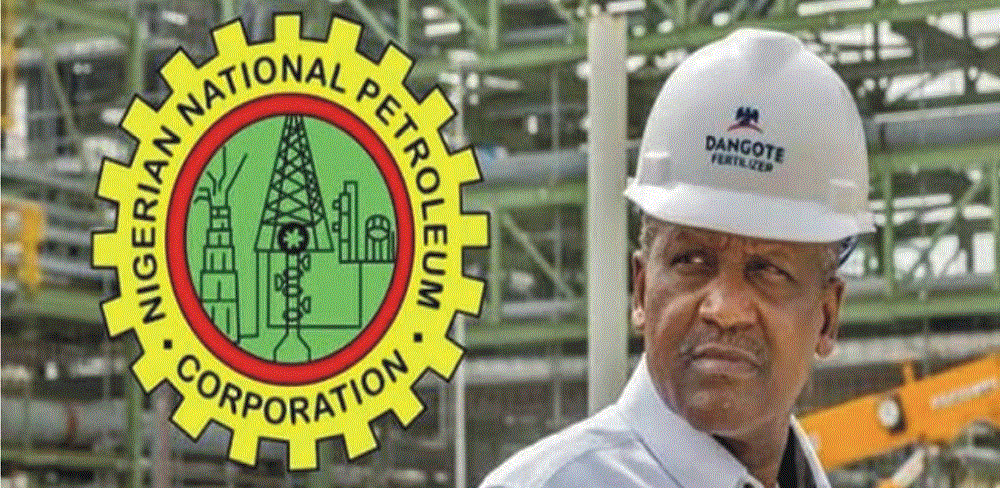Since the Dangote Refinery has enough capacity to meet domestic demand, the Nigerian National Petroleum Company Limited (NNPC) has ordered oil marketers to stop importing petrol.
According to TNC’s findings, this directive was made at a high-level meeting in Abuja that was attended by Mele Kyari, the CEO of the NNPC Group, representatives from the Depot and Petroleum Products Marketers Association of Nigeria (DAPPMAN), the Major Oil Marketers Association of Nigeria (MOMAN), and important stakeholders from companies like 11 Plc, Matrix, AA Rano, and the Nigerian Midstream and Downstream Petroleum Regulatory Authority (NMDPRA).
Sources with knowledge of the talks claim that the NNPC clearly read the “riot act,” alerting all parties involved that the Dangote Refinery’s approval would now be necessary for the supply of petrol.
“NNPC emphasised that going forward, no marketer would be permitted to import petrol without specific clearance tied to Dangote’s capacity,” revealed one attending official.
Despite being strategic, the action has caused anxiety among oil marketers. Concerns were voiced by stakeholders regarding Dangote Refinery’s capacity to consistently distribute its products throughout Nigeria’s vast network and serve the market.
Despite its capacity, marketers questioned whether the refinery’s production and logistics capabilities were sufficiently equipped to manage the nation’s varying demands.
The Dangote Refinery’s suggested payment plan was another hotly debated topic at the conference. Dangote demands upfront payment from merchants, in contrast to the conventional importation procedure, which settles payments when products arrive at depots. This change has raised concerns regarding cash flow and operational viability for smaller downstream industry participants.
One stakeholder stated, “Paying upfront greatly raises financial pressure on marketers, particularly those with minimal cash. For decades, we have used a post-delivery payment mechanism that better corresponds with our liquidity cycles.”
According to S&P Global Commodities at Sea statistics, Dangote has sold its diesel, jet fuel, and other products on the international market since it began operations in January, mostly through dealers Vitol and Trafigura and the multinational energy corporation BP.
According to the refinery executive, it first entered into an exclusive supply arrangement with NNPC for its petrol, but by November 4 it had also started selling to regional marketers.
With a sulphur concentration of less than 10 parts per million, the refinery has claimed that their petrol satisfies quality criteria. This is a major improvement for the Nigerian market, where 500 parts per million was still the norm in late 2023.
Another source claimed that Dangote’s premium petrol, which costs 10 parts per million, was more expensive than imported petrol, which costs 50 parts per million.
In addition to accusing illegal low-quality imports of undercutting its prices and threatening to sue state oil company NNPC for continuing to import fuel, refinery CEO Aliko Dangote complained on 29 October that the refinery was wasting money by keeping more than 500 million litres (about 3.1 million barrels) of fuel in storage.
The NNPC and its partners imported 13,500 metric tonnes of jet fuel, 414,018.764 metric tonnes of diesel, and 1.5 million metric tonnes of PMS over the 42-day period from October 1 to November 11, 2024, according to documents obtained by BusinessDay. This is around N3 trillion, or $1.8 billion.
Companies such as Bovas, AA Rano, Matrix, Fatgbems, Deepwater, Raj, T-Time, Rainoil, Prudent, Chisco, Nepal, AYM Shafa, Northwest, Shorelink, and others received petrol from various vessels in Lagos, Warri, Calabar, and Port Harcourt, according to a document that detailed imported refined products during the review period.
The Tale Of Petrol Imports
Mele Kyari, the group chief executive officer (GCEO) of NNPC, stated that the national oil firm has ceased importing petroleum during his remarks on November 12 at the 42nd Nigerian Association of Petroleum Explorationists (NAPE) annual international conference in Lagos.
According to Kyari, the business currently purchases goods from other nearby refineries as well as the Dangote plant.
“NNPC only purchases from domestic refineries today; we do not import any products,” he had stated.
However, the national oil company said in a statement on Friday that Kyari was misquoted.
It states that the GCEO’s assertion that “NNPC does not import any product today; we are only taking from domestic refineries” was misinterpreted.
“It should not be interpreted as implying that NNPC Ltd. is required to be the sole offtaker of any refinery or that we will no longer import petroleum.”
“While NNPC prioritises sourcing goods from domestic refineries, this is dependent on economic feasibility. Local supply will be preferred if it is less expensive, but other marketers will also consider total costs when selecting whether to buy locally or import.”



